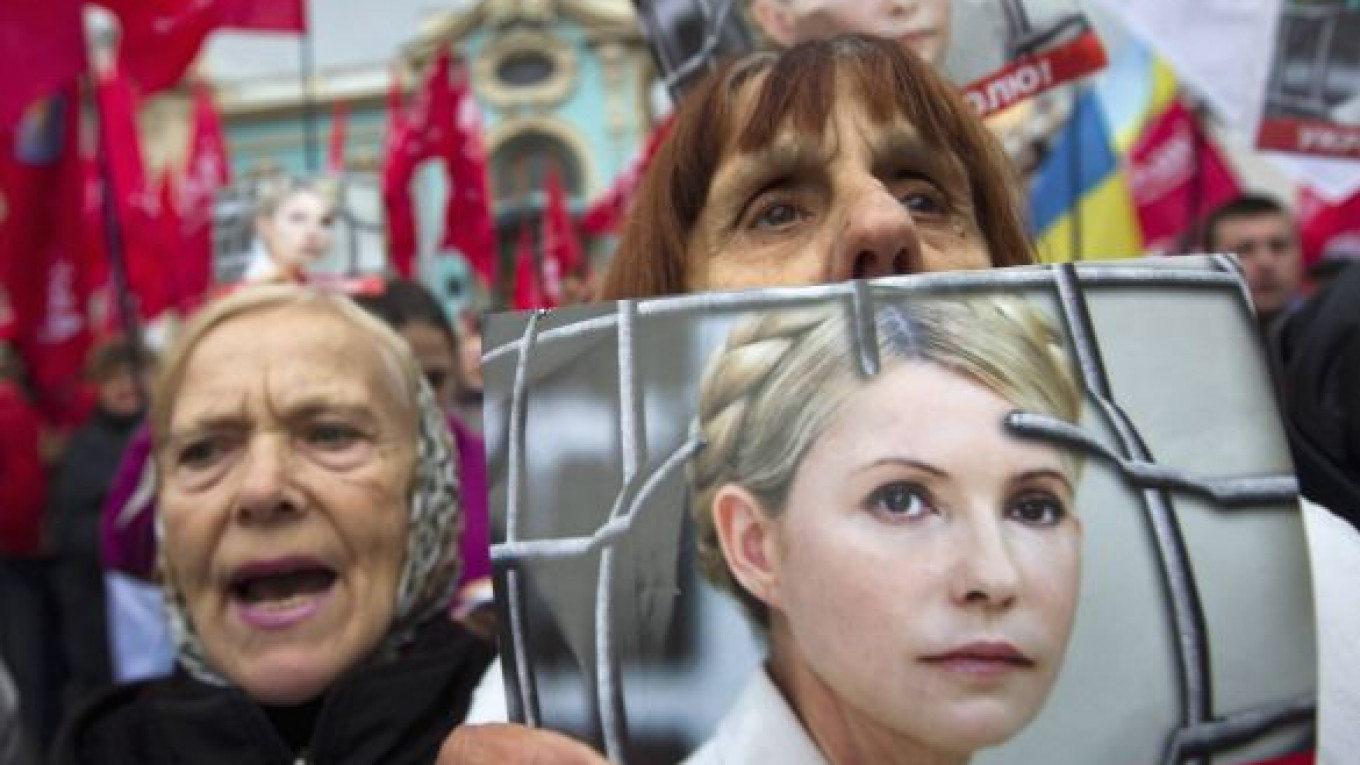European Union mediators resumed efforts in Ukraine on Wednesday to secure the release from jail of opposition leader Yulia Tymoshenko, as the clock ticks down to the signing of landmark trade accords at the end of the month.
The agreements on association and free trade, due to be signed at an EU-Ukraine summit on Nov. 28 in the Lithuanian capital Vilnius, offer the former Soviet republic of 46 million people the chance of an historic shift west away from Russia.
But signature hinges on freedom for ex-prime minister Tymoshenko, a fierce opponent of President Viktor Yanukovych. She was jailed in 2011 for seven years for abuse of office after a trial which the EU says was political.
Irish politician Pat Cox and former Polish President Aleksander Kwasniewski, who have been shuttling between Brussels and Kiev for more than 18 months on a mission to nail down a deal over Tymoshenko, went straight into meetings with officials after arriving in Kiev on Wednesday, EU sources said.
They are due to meet Yanukovych and opposition members and are likely to visit Tymoshenko in the northern town of Kharkiv, where she is receiving hospital treatment under prison guard.
Before their arrival, Yanukovych, whose pro-Europe course has upset Russia, Ukraine's biggest trade partner, told a regional economic forum the Vilnius accords would mark "the beginning of a process of broader and deeper integration".
He made no specific reference to Tymoshenko or the efforts to reach a compromise on her case.
EU foreign ministers are due at a pre-summit meeting on Nov. 18 to assess whether Kiev has met key democratic criteria, including ending what the bloc calls "selective justice", to allow for the signing to go ahead.
The EU mediators are focusing their attention on a compromise under which Tymoshenko, 52, can travel to Germany to receive medical treatment for spinal problems.
The Ukrainian parliament, dominated by pro-Yanukovych deputies and allies, is now haggling over the wording of a draft law that would allow her to travel abroad — the crux being whether she goes as a free person or as a convicted criminal.
Yanukovych, who only narrowly beat her in a runoff vote for president in February 2010, has balked at granting her a pardon. Political analysts say he wants her politically sidelined when he makes his bid for a second term in early 2015.
Her supporters want a "full amnesty" so she can be cleared of her jail sentence and be free to return to politics one day.
Pro-Yanukovych deputies are pushing for a tougher draft which would mean she would have to return to Ukraine to complete her sentence after medical treatment.
The conditions attached by the Yanukovych camp to any release of Tymoshenko to Germany could have a direct bearing on any decision made at the Nov. 18 EU meeting.
The EU is split between states such as Poland, which stress the need to prise Ukraine away from Russia's embrace, and those like Sweden and the Netherlands, which argue the bloc should not compromise on principles of civil rights and justice.
A Message from The Moscow Times:
Dear readers,
We are facing unprecedented challenges. Russia's Prosecutor General's Office has designated The Moscow Times as an "undesirable" organization, criminalizing our work and putting our staff at risk of prosecution. This follows our earlier unjust labeling as a "foreign agent."
These actions are direct attempts to silence independent journalism in Russia. The authorities claim our work "discredits the decisions of the Russian leadership." We see things differently: we strive to provide accurate, unbiased reporting on Russia.
We, the journalists of The Moscow Times, refuse to be silenced. But to continue our work, we need your help.
Your support, no matter how small, makes a world of difference. If you can, please support us monthly starting from just $2. It's quick to set up, and every contribution makes a significant impact.
By supporting The Moscow Times, you're defending open, independent journalism in the face of repression. Thank you for standing with us.
Remind me later.






